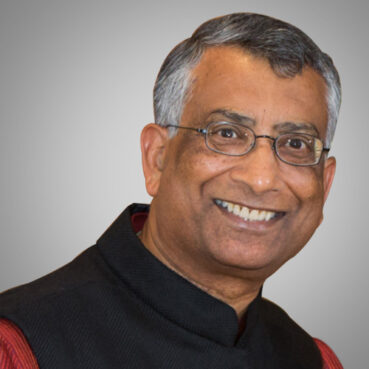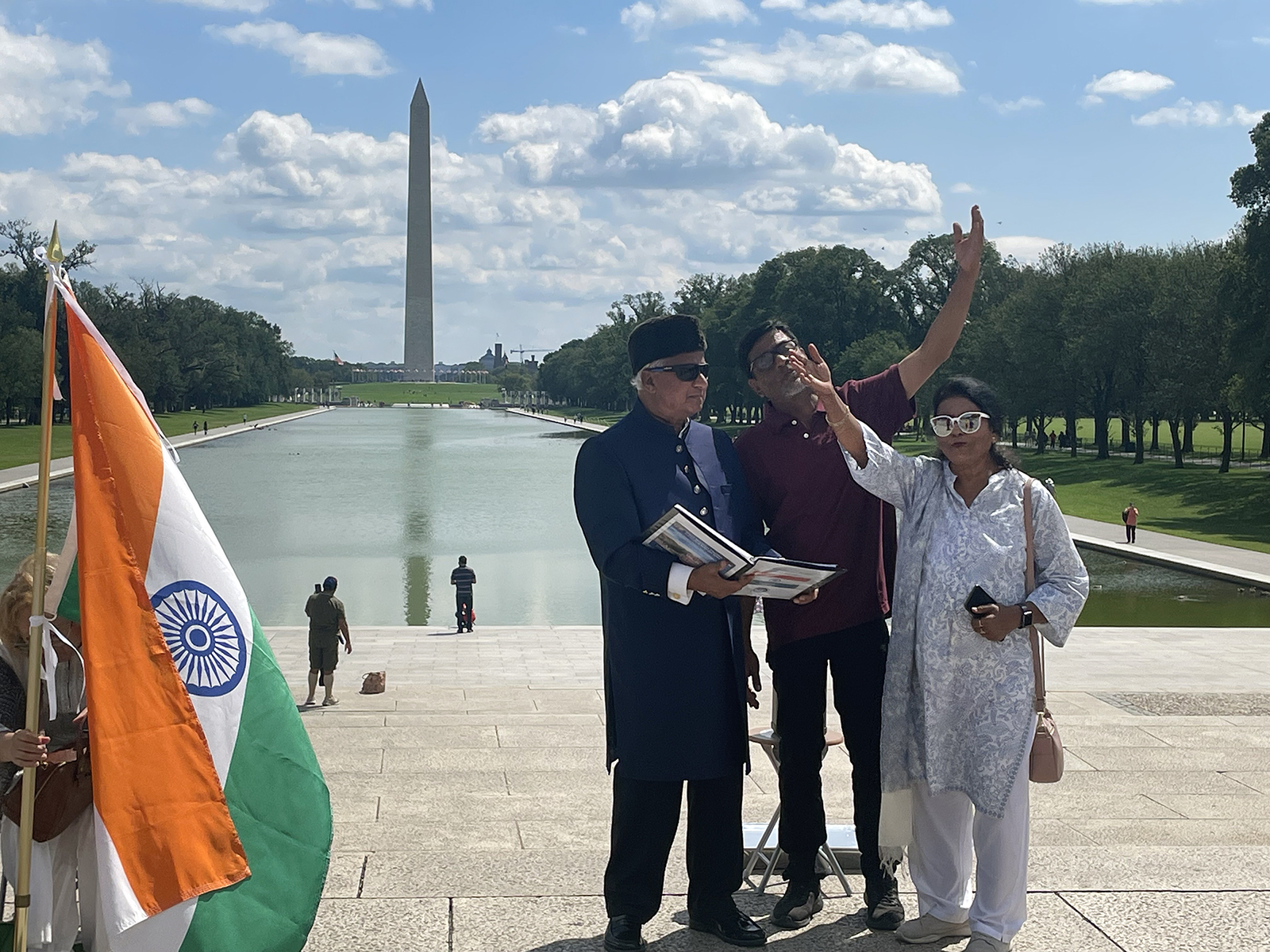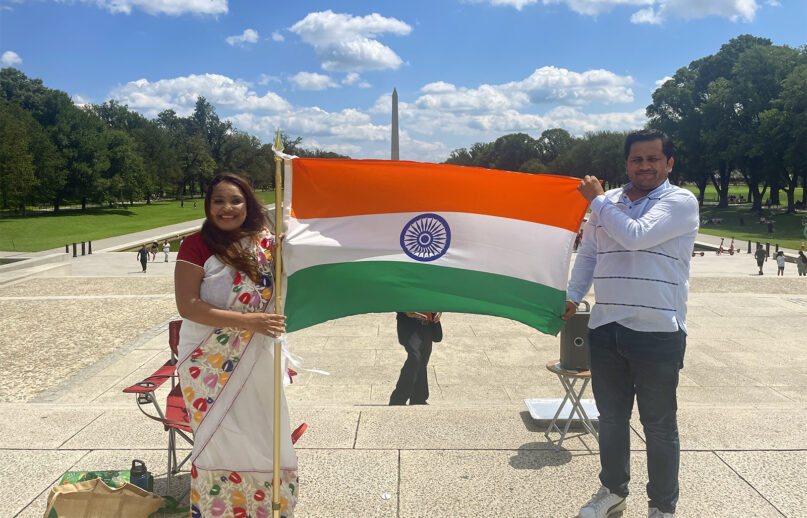(RNS) — Edison, New Jersey, home to the highest concentration of Indian Americans in the nation and often referred to as Little India by outsiders and natives alike, has been the hub for India Day celebrations for years.
This year was no exception. Crowds gathered Sunday (Aug. 13) in an advance celebration of the Aug. 15 anniversary of India’s independence from Britain in 1947. Loud music, vibrant flags, traditional costumes and even the Hindu deities Ram and Hanuman colored the streets of Edison. Businesses and temples passed out lassis and prasad.
In the United States, where 4.4 million people of Indian heritage reside, Indian Independence Day is a recognition of freedom — a multifaith, multicultural celebration of Indian civilization before and after the British Raj. But for many Indian Americans today, celebrating India Day comes with the complicated decision of whether to celebrate, ignore or protest their ancestral homeland’s current political atmosphere and the rise of Hindu nationalism there.
A bulldozer at last year’s parade in Edison stirred controversy and brought a spotlight to the political tensions simmering under the surface of India’s diaspora. The bulldozer, adorned with photos of Indian politician Yogi Adityanath, offended many Indian American Muslims who felt the bulldozer’s presence was a form of intimidation linked to the razing of Muslim homes in Uttar Pradesh, India.
The Indian Business Association issued a statement apologizing for the bulldozer, calling it a “divisive image” that did not reflect the mission of the IBA or its India Day parade. But for some scholars and activists, the presence at this year’s parade of groups connected to India’s Bharatiya Janata Party, such as the Hindu Swayamsevak Sangh and the Vishwa Hindu Parishad of America, signaled the event remained a political statement.

Jai Bansal. Photo courtesy of HinduPACT.org
That’s missing the point, according to Jai Bansal, vice president of education for the VHPA, also known as the World Hindu Council.
“India is 80% Hindus, and if 80% of society develops a certain amount of pride in their heritage, and in their civilizational contributions at large, why should it threaten anyone?” said Bansal.
Indian pride, he said, is a right that has been denied to Indians time and time again by outside influences.
“When we celebrate Independence Day, it’s not celebrating a political event; it is celebrating freedom from centuries of subjugation by foreigners,” Bansal added.
Ganesh Ramakrishnan, the Northeast outreach director for the HSS, said a parade like this is the perfect way to bring the diverse Indian community together, especially in this “digital age” where Indians seem divided along political lines.
Youth and young adults in the HSS marched Sunday with placards highlighting the socio-cultural organization’s messages: “Service to humanity, service to Divinity,” “God Bless America,” “God Bless India” and “Universal Oneness.”
“Political ideologies can separate people, but philosophies are deeper, broader and more spiritual,” said Ramakrishnan. “This parade was echoing all of those sentiments.”
RELATED: Preserving stories of Hindu, Muslim and Sikh friendships through India’s partition
But many in the diaspora hope to shift the messaging this year — to see Indian Americans, the highest-earning ethnic group in the U.S., be recognized for their contributions to society, not their country’s politics.
Another India Day celebration, a few hundred miles away at the U.S. capital, also took place on Sunday to mark the 76th anniversary of India’s independence. And while the turnout at the Lincoln Memorial in Washington was not near that of Edison, the message was clear: India is for all Indians.
Mike Ghouse, founder and president of the nonprofit Center for Pluralism, introduced the event as one to celebrate an inclusive India — a civilization that he says was the first in the universe to embrace religious diversity.

Mike Ghouse, on left holding binder, leads an India Independence Day event on the National Mall in Washington, Aug. 13, 2023. RNS photo by Richa Karmarkar
“India has always welcomed everyone. We have learned to live with each other for a long time,” said Ghouse. “There is a lot of happiness when we come together. That is the joy that all Indians deserve.”
An Indian American Muslim, Ghouse organized the event for Indians of any cultural or religious background to sing patriotic Indian songs. His mission, he says, is to develop “positive patriotism” among Indians by reminding them of the nation’s home-grown plurality.
Over 200 languages are spoken in India, as well as thousands of dialects. In addition, Hindus, Muslims, Sikhs, Buddhists, Jains, Christians, Jews, Zoroastrians and atheists all call India home.
RELATED: How a mysterious Indian religious figure united Hindus and Muslims
“Humility builds bridges,” said Ghouse. “We are created to be different. If by nature we are diverse, we must also be diverse in our faiths.”
Priya Kothari moved to Maryland just one year ago from her home in India, where she ran a nonprofit helping women start small businesses. She says she was so grateful to find family here after leaving her own family.
“It’s a very proud moment for me to stand here opposite the Lincoln Memorial to talk about India and the celebration of Indian Independence Day,” said Kothari. “One of the best parts is that I’m a part of this.”





